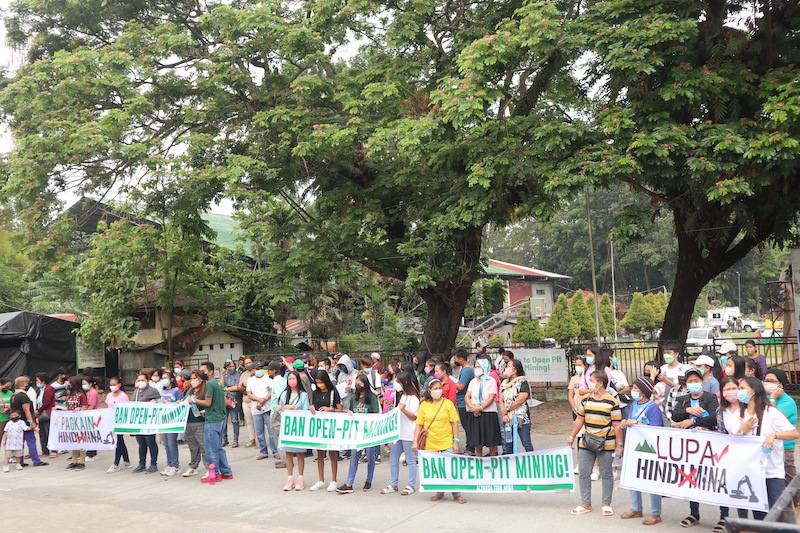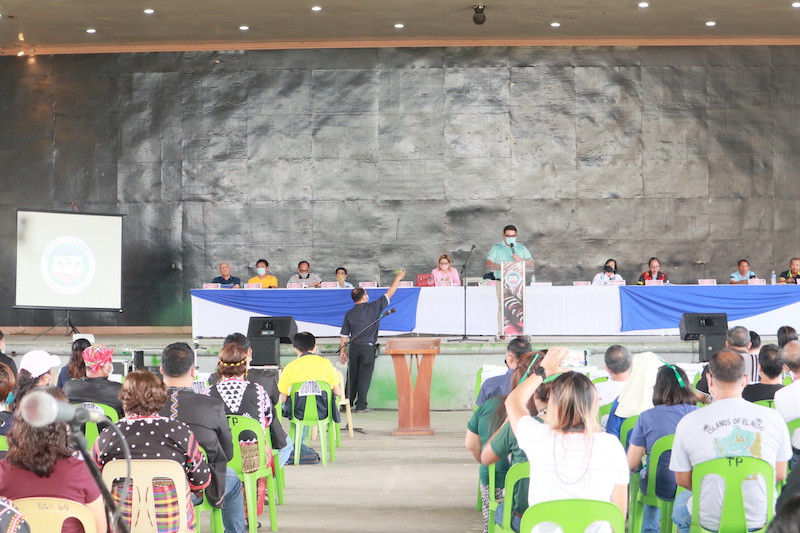DAVAO CITY (MindaNews / 20 February) – The Catholic Church and its allied groups in South Cotabato are urging anew the Sangguniang Panlalawigan to retain the ban on open-pit mining, the method that will be employed in the controversial US$5.9 billion Tampakan project, the largest untapped copper-gold minefield in Southeast Asia.
Protests greeted Friday’s public forum at the gymnasium of Tampakan town organized by the provincial board, which has been deliberating petitions by pro-mining advocates to lift the open-pit mining ban contained in the province’s landmark Environment Code approved 12 years ago.
The next public forum is set on February 24 in Koronadal City, the capital of South Cotabato.
Vice Governor Vicente de Jesus, Sangguniang Panlalawigan presiding officer, earlier said the collegial body decided to hold the public hearing in bigger venues to accommodate a bigger crowd to hear the arguments of pro- and anti-mining proponents.
 Protesters from the Diocese of Marbel and from multisectoral groups in South Cotabato air their sentiments against the proposed lifting of the ban on open-pit mining outside the gymnasium in Tampakan, South Cotabato where a public hearing was conducted on Friday, 18 February 2022. Photo courtesy of Social Action Center of the Diocese of Marbel
Protesters from the Diocese of Marbel and from multisectoral groups in South Cotabato air their sentiments against the proposed lifting of the ban on open-pit mining outside the gymnasium in Tampakan, South Cotabato where a public hearing was conducted on Friday, 18 February 2022. Photo courtesy of Social Action Center of the Diocese of Marbel
Fr. Jerome Millan, director of the Social Action Center of the Diocese of Marbel, said the local Catholic Church and its multisectoral support groups vehemently oppose the amendment of the Environment Code’s Section 22 (b), which bans open-pit mining in the province.
“The lifting of the ban will open our province to all mining methods, including large-scale open-pit mining operations with huge and irreversible impacts to the environment and the communities, not only in our province but also to the neighboring provinces and municipalities,” he said in a statement.
Millan said they protested Friday in Tampakan town to express their dismay on the public hearing conducted by the Sangguniang Panlalawigan, which “gears toward the lifting of the ban provided by the landmark environmental ordinance of the province, the Environment Code.”
The diocese launched in August 2021 a signature campaign to support its calls for the Sangguniang Panlalawigan not to lift the ban on open-pit mining. The group submitted 93,453 signatures to the provincial board last December.
However, the diocese has yet to receive any concrete and official response on their signature campaign.
Millan said the scope and weight of the policy being reviewed require substantial and meaningful participation from South Cotabato residents.
“We urge the SP members to conduct more public hearings in other municipalities within the province. The SP members have to listen to the voice of the people and ensure that this legislative process is towards protecting the people of the present and the generations to come and providing all with a balanced ecology to live with,” the group’s statement said.
Millan said the Tampakan project “failed to convince them that it will bring genuine, sustainable and equitable development to the area.”
“It threatens our food supply, watersheds, water sources, the safety and well-being of the people, including disregard of environmental regulations. It even increases the risks of disasters due to climate change,” he said.
 Public hearing initiated by the Provincial Board of South Cotabato on the proposed lifting of the ban on open-pit mining at the gymnasium of Tampakan in South Cotabato. Photo courtesy of Social Action Center of the Diocese of Marbel
Public hearing initiated by the Provincial Board of South Cotabato on the proposed lifting of the ban on open-pit mining at the gymnasium of Tampakan in South Cotabato. Photo courtesy of Social Action Center of the Diocese of Marbel
Bae Dalena Samling, chieftain of the Danlag Tribal Council, which is backing the Tampakan project, pointed out that the indigenous peoples within the Tampakan project “have given their consent” to Sagittarius Mines, Inc. (SMI) to mine the area.
She was referring to the Certification Precondition (CP), which the National Commission on Indigenous Peoples granted in September 2020 to SMI, developer of the Tampakan project.
The CP is a certification that the indigenous cultural communities have given their consent to the mining venture within their ancestral domain and that the Free, Prior and Informed Consent process has been satisfactorily complied with by the company.
“Let the Tampakan project proceed to commercial production,” Samling told MindaNews earlier, noting the mining project’s economic benefits not just their community but also the surrounding localities.
The Tampakan project has the potential to yield an average of 375,000 tons of copper and 360,000 ounces of gold in concentrate per annum in the 17-year-life of the mine, according to a company study.
In 2017, the late Environment Secretary Gina Lopez banned open-pit mining across the country, a directive that was ordered lifted last December by Environment Secretary Roy Cimatu, a retired military general who resigned recently due to health reasons.
Cimatu’s order came eight months after President Rodrigo Duterte signed Executive Order 130, which lifted the moratorium on new mining agreements to spur economic growth in the country.
The late President Benigno Aquino issued the moratorium on new mining agreements in 2012. (Bong Sarmiento / MindaNews)
